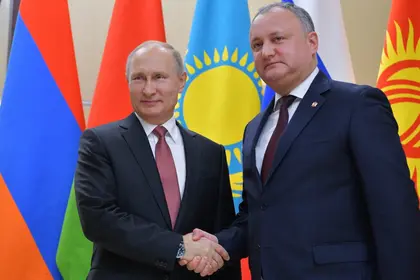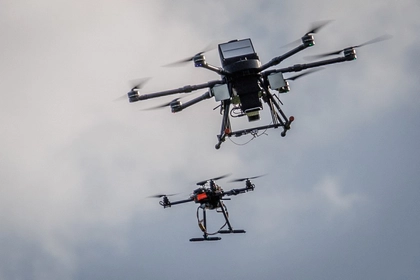As Ukraine prepares for its spring counteroffensive and Russia continues to perform poorly on the battlefield, Putin is ramping up his attempts to undermine Moldova as another distraction from Ukraine for the West. Putin has used his proxies Transnistria to put pressure on Moldova for decades and he now has his eyes on Gagauzia.
The electorate in Moldova’s autonomous Gagauzia region go to the polls to choose a new governor on May 14. The two candidates are Grigorii Uzun, from the Socialist Party led by former Moldovan President Igor Dodon, and Evghenia Gutsul, the the pro-Russian Shor Party candidate, will face each other in the second round of the election. However, both the candidates represent political proxies of Russia, which poses yet another threat to Moldova’s internal security.
JOIN US ON TELEGRAM
Follow our coverage of the war on the @Kyivpost_official.
“The election of any of the above two candidates in Gagauzia will quite probably continue the trend of Kremlin’s attempts to gain influence in the region and might even increase, in the circumstances of the war in Ukraine, pressure on the pro-Western Moldovan Government,” said Vlad Lupan, former Moldovan Ambassador to the United Nations, now Adjunct Professor at NYU and FDU. “If the new Head of Gagauzia (Bashkan) is to pursue an antagonistic relationship with Moldovan authorities, this may increase potential destabilization in Moldova.”
Although both candidates espouse pro-Russian views, Russian spokesperson Maria Zakharova complained that the Russian Embassy in Moldova had been denied an opportunity to act as an observer at the elections. She confidently stated that Moscow hopes that “the newly elected leadership of the region will continue to develop its traditional ties with our country and the Russian regions.”

Russia Tries to Sabotage Moldova’s European Ambitions as It Did for Georgia and Belarus
This does not come as a surprise to anyone following Russian activities in Moldova. Russia has historically had its eyes on Moldova and used Transnistria, a breakaway region in Moldova run by pro-Russia leaders, to host 1500 Russian “peacekeeping” forces, further jeopardizing Moldova’s security situation.
In February, Ukrainian intelligence intercepted Russian plans to “break the democracy of Moldova and establish control over Moldova.” Moldovan President Sandu pre-emptively exposed a potential Russian plot that includes details to stage a coup on Moldova’s government involving opposition protests, attacking government buildings, and toppling the government with the help from the citizens of the Russian Federation, Belarus, Serbia, and Montenegro.
Soon after this, a Russian missile violated Moldova’s airspace, leading Moldova to close its airspace after an “object similar to a weather balloon” was found in its territory.
For Russia, Transnistria is important not only for ideological reasons but for strategic reasons that would facilitate Russia’s broader plan to destabilize the Moldovan state. Russia has been using Transnistria as a potential battlefield with the West by sowing chaos and putting the EU and NATO on the defensive. However, as Russian “peacekeepers” are too weak to militarily challenge the West, the Kremlin has resorted to asymmetric means to destabilize the region.
For instance, Russia has been weaponizing energy in Moldova by blackmailing Chisinau, exploiting the economic crisis in Moldova in the most recent protests. Moscow has also been using the information space to challenge Moldova, with the Russian-backed Shor Party suspected of being behind a series of protests in Chisinau.
Before Moldovan PM Natalia Gavrilița resigned, she said: "We are seeing elements of hybrid war... In 2022 we have seen the biggest cyber-attacks in the history of our country, and we are seeing bomb threats." Although Moldova suspended some Russian media last year, Moscow is still active in the information space.
Perception matters in Moldova. This week, the European Commission “paid a €40 million loan in financial support to the Republic of Moldova, as part of an ongoing Macro-Financial Assistance operation in the country worth €150 million in total,” which is a step in the right direction. However, despite European economic support, information regarding Western support to Moldova often does not reach ordinary citizens. This can be attributed to the Kremlin’s successful information operations in Moldova that convey Russia as a crucial regional partner, messages that resonate most closely with the traditionalist, pro-Russian population in Transnistria and Gagauzia.
Furthermore, Moscow does not need to create an economic crisis, as it can simply exploit existing economic chaos to portray itself as a more reliable partner than the West. This means that while the West’s economic support for Moldova is crucial, the West should do so in conjunction with counter-information campaigns. One avenue would be the EU’s extensive use of social media platforms to reach people in Moldova as a display of European support for the Moldovan people. The EU could also work with members of the pro-Western policy makers to amplify those messages with the general voter base and neutralize apathy and indifference among the population.
Information operations should also target pro-Russian audiences in Moldova. Due to Russian propaganda, they still do not believe in Russia’s poor performance on the battlefield and it’s likely they will not support Western democratic values. However, exposing Russia as an unreliable ally will likely resonate with them, given Russia’s recent poor track record of supporting its regional allies. For instance, last year, Armenian Prime Minister Nikol Pashinyan formally asked the Moscow-led Collective Security Treaty Organization to intervene and help after hostilities broke out between Armenia and Azerbaijan in the Nagorno-Karabakh region by triggering collective defense Article IV, which obliges the organization to protect its states. Russia did not lend a helping hand, demonstrating the Russian propensity to promptly renege on its security commitments to its allies for pragmatic reasons.
The West should amplify these cases of Russian unreliability by informing the pro-Russian population in Moldova that Russia refused to step in and help Armenia, and that it is just a matter of time before Moscow throws Transnistria and Gagauzia under the bus, too. Accordingly, the West’s immediate goal with the pro-Russian population in Moldova should be to neutralize the Kremlin narrative that portrays Russia as a reliable partner.
The West has been reluctant to use information to its full advantage in fighting Russia in Moldova, thus yielding the information space to anti-Western propaganda. This silence lends credibility to Kremlin-spun narratives and the West must enter the information space in Moldova and flip the script on Putin’s information warfare.
You can also highlight the text and press Ctrl + Enter






